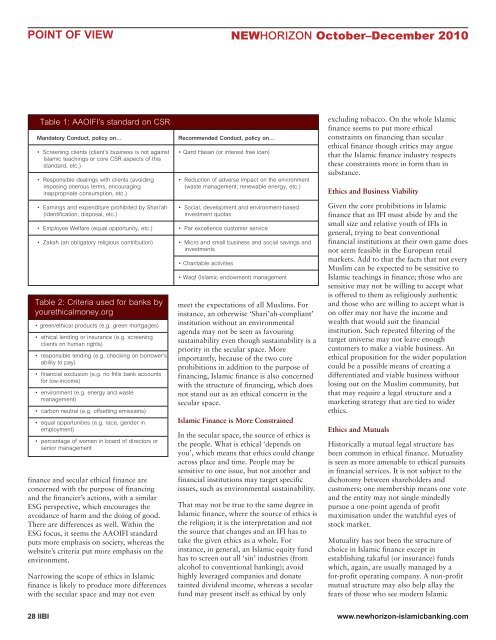NEWHORIZON
NEWHORIZON - Institute of Islamic Banking and Insurance
NEWHORIZON - Institute of Islamic Banking and Insurance
- No tags were found...
You also want an ePaper? Increase the reach of your titles
YUMPU automatically turns print PDFs into web optimized ePapers that Google loves.
POINT OF VIEW<br />
<strong>NEWHORIZON</strong> October–December 2010<br />
Table 1: AAOIFI’s standard on CSR<br />
Mandatory Conduct, policy on…<br />
• Screening clients (client’s business is not against<br />
Islamic teachings or core CSR aspects of this<br />
standard, etc.)<br />
• Responsible dealings with clients (avoiding<br />
imposing onerous terms, encouraging<br />
inappropriate consumption, etc.)<br />
• Earnings and expenditure prohibited by Shari’ah<br />
(identification, disposal, etc.)<br />
• Employee Welfare (equal opportunity, etc.)<br />
• Zakah (an obligatory religious contribution)<br />
Table 2: Criteria used for banks by<br />
yourethicalmoney.org<br />
• green/ethical products (e.g. green mortgages)<br />
• ethical lending or insurance (e.g. screening<br />
clients on human rights)<br />
• responsible lending (e.g. checking on borrower’s<br />
ability to pay)<br />
• financial exclusion (e.g. no frills bank accounts<br />
for low-income)<br />
• environment (e.g. energy and waste<br />
management)<br />
• carbon neutral (e.g. offsetting emissions)<br />
• equal opportunities (e.g. race, gender in<br />
employment)<br />
• percentage of women in board of directors or<br />
senior management<br />
finance and secular ethical finance are<br />
concerned with the purpose of financing<br />
and the financier’s actions, with a similar<br />
ESG perspective, which encourages the<br />
avoidance of harm and the doing of good.<br />
There are differences as well. Within the<br />
ESG focus, it seems the AAOIFI standard<br />
puts more empha sis on society, whereas the<br />
website’s criteria put more emphasis on the<br />
environment.<br />
Narrowing the scope of ethics in Islamic<br />
finance is likely to produce more differences<br />
with the secular space and may not even<br />
Recommended Conduct, policy on…<br />
• Qard Hasan (or interest free loan)<br />
• Reduction of adverse impact on the environment<br />
(waste management, renewable energy, etc.)<br />
• Social, development and environment-based<br />
investment quotas<br />
• Par excellence customer service<br />
• Micro and small business and social savings and<br />
investments<br />
• Charitable activities<br />
• Waqf (Islamic endowment) management<br />
meet the expectations of all Muslims. For<br />
instance, an otherwise ‘Shari’ah-compliant’<br />
institution without an environmental<br />
agenda may not be seen as favouring<br />
sustainability even though sustain ability is a<br />
priority in the secular space. More<br />
importantly, because of the two core<br />
prohibitions in addition to the purpose of<br />
financing, Islamic finance is also concerned<br />
with the structure of financing, which does<br />
not stand out as an ethical concern in the<br />
secular space.<br />
Islamic Finance is More Constrained<br />
In the secular space, the source of ethics is<br />
the people. What is ethical ‘depends on<br />
you’, which means that ethics could change<br />
across place and time. People may be<br />
sensitive to one issue, but not another and<br />
financial institutions may target specific<br />
issues, such as environmental sustainability.<br />
That may not be true to the same degree in<br />
Islamic finance, where the source of ethics is<br />
the religion; it is the interpretation and not<br />
the source that changes and an IFI has to<br />
take the given ethics as a whole. For<br />
instance, in general, an Islamic equity fund<br />
has to screen out all ‘sin’ industries (from<br />
alcohol to conventional banking); avoid<br />
highly leveraged companies and donate<br />
tainted dividend income, whereas a secular<br />
fund may present itself as ethical by only<br />
excluding tobacco. On the whole Islamic<br />
finance seems to put more ethical<br />
constraints on financing than secular<br />
ethical finance though critics may argue<br />
that the Islamic finance industry respects<br />
these constraints more in form than in<br />
substance.<br />
Ethics and Business Viability<br />
Given the core prohibitions in Islamic<br />
finance that an IFI must abide by and the<br />
small size and relative youth of IFIs in<br />
general, trying to beat conventional<br />
financial institutions at their own game does<br />
not seem feasible in the European retail<br />
markets. Add to that the facts that not every<br />
Muslim can be expected to be sensitive to<br />
Islamic teachings in finance; those who are<br />
sensitive may not be willing to accept what<br />
is offered to them as religiously authentic<br />
and those who are willing to accept what is<br />
on offer may not have the income and<br />
wealth that would suit the financial<br />
institution. Such repeated filtering of the<br />
target universe may not leave enough<br />
customers to make a viable business. An<br />
ethical proposition for the wider population<br />
could be a possible means of creating a<br />
differentiated and viable business without<br />
losing out on the Muslim community, but<br />
that may require a legal structure and a<br />
marketing strategy that are tied to wider<br />
ethics.<br />
Ethics and Mutuals<br />
Historically a mutual legal structure has<br />
been common in ethical finance. Mutuality<br />
is seen as more amenable to ethical pursuits<br />
in financial services. It is not subject to the<br />
dichotomy between shareholders and<br />
customers; one membership means one vote<br />
and the entity may not single mindedly<br />
pursue a one-point agenda of profit<br />
maximisation under the watchful eyes of<br />
stock market.<br />
Mutuality has not been the structure of<br />
choice in Islamic finance except in<br />
establishing takaful (or insurance) funds<br />
which, again, are usually managed by a<br />
for-profit operating company. A non-profit<br />
mutual structure may also help allay the<br />
fears of those who see modern Islamic<br />
28 IIBI<br />
www.newhorizon-islamicbanking.com
















